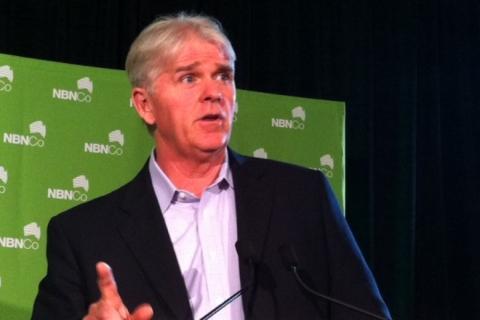Less than two months before NBN Co's new CEO Bill Morrow takes the helm and questions are being raised about NBN Co's direction and the tasks that will fall to Morrow when he arrives. In Technology Spectator Morrow's challenge is highlighted and the hurdles ahead are going to be real test of his leadership and management skills.
Read the article here
NBN Co’s new CEO Bill Morrow will join the company in less than two months and will bring with him a strong and positive leadership approach that has been applied successfully during his time in the industry. In little more than a year after joining Vodafone Hutchinson Australia, Morrow will leave Vodafone in a much stronger position than it was when he arrived.
Morrow’s task to turn around Vodafone after the Vodafail saga was huge in an Australian context, and Vodafone is slowly overcoming the lasting negative effect that Vodafail had on customer perception. Vodafone recently announced that more than one million 4G devices were now connected to the Vodafone 4G network and growth was continuing.
Morrow is passionate about telecommunications, but his passion alone may not be enough to safely negotiate the NBN minefield. Morrow’s achievement at Vodafone, Australia’s smallest mobile cellular provider, has brought industry respect but the Everest he must climb to be successful at NBN Co will be unlike anything he has undertaken previously.
NBN Co is currently undergoing an internal reorganisation due to significant staff churn that commenced with the Coalition’s election win last year and the shift to the government’sNBN policy mandated multi-technology model (MTM).
So what will Morrow focus on during his first months at NBN Co?
Politics
As the CEO of NBN Co Morrow will need to face the public and he will be asked to explain why the shift to Coalition’s multi-technology mix (MTM) option is warranted and what will the public actually get for $43 billion.
Morrow will not be able to hide behind press releases so he will need to be upfront in his interpretation of what NBN Co has been asked to do.
Weasel words will not cut it and any statements made by Morrow that rely upon dodgy figures, and the government’s three NBN related reviews and audits have been designed to provide an endless supply, will be the beginning of the end for public trust in what he is trying to achieve.
How will Morrow temper the Coalition’s NBN plan and convince the Communication Minister Malcolm Turnbull that he must take up the mantle yet again and argue with his colleagues about the NBN’s future?
Morrow’s success or failure will depend largely on his ability to influence the political agenda because Australians expect more for $43 billion than a network with a 10 year life span and no upgrade pathway to an all fibre access network.
Competition
The Coalition’s NBN plan, known as NBN 2.0, calls for increased competition, but how this is to occur without having a terminal effect on NBN Co’s monopoly wholesale network is yet to be fully explained.
Morrow has stated that he would like to see the NBN provide infrastructure and backhaul connectivity for mobile cellular providers to expand their networks and possibly for new mobile cellular providers to enter the market – TPG possibly?
There is logic behind Morrow’s thoughts but there is also the possibility that by expanding the mobile cellular network footprints there will be further calls for fixed access network infrastructure to be wound back in favour of mobile cellular providers.
Utilising $43 billion of the public’s money to provide Vodafone, Optus or TPG with a means to build and grow a mobile cellular network is not acceptable in itself, but there is strong justification for the NBN to better utilise the infrastructure and provide a wider range of product offerings.
Turnbull has recently queried TPG’s plans to rollout FTTB to about 500,000 apartments in a cherry picking model and Telstra has previously warned that TPG’s plans could undermine NBN Co’s profit model.
Competition policy in the communications sector is one of the biggest hurdles that exist for this nation to be a strong contender in the global digital economy so Morrow will have to tread carefully else NBN Co could end up spending more time fighting legal battles than building networks.
Will Morrow also promote the NBN as a wholesale provider for Wi-Fi networks and permit retail service providers to offer services to trains, buses, cars, trucks, planes and boats? Or is Morrow simply thinking about his current employer and next job after NBN Co?
Negotiations
There can be no MTM NBN 2.0 without a raft of agreements being renegotiated. NBN Co and the government have already commenced this process but it will fall to Morrow to complete key agreements with Telstra, Optus and the construction partners.
NBN Co will have to renegotiate the $11 billion Telstra agreement which included decommissioning Telstra’s copper and HFC networks and leasing infrastructure needed for the fibre rollout.
Optus reached an agreement with NBN Co to decommission its HFC network and migrate customers to the NBN and in doing so described the agreement as “a giant leap towards true competition”. It will be interesting to see how Optus describes the anticipated future NBN Co agreement to retain the HFC network and offer wholesale access. One suggestion might be “a giant leap away from true competition”.
Telstra, Optus and NBN Co’s construction partners know they’re in the box seat and the question will be how desperate will the government and NBN Co be to achieve NBN 2.0? There can be no doubt that Telstra, Optus and NBN Co’s construction partners will see the coming months as an unprecedented opportunity in Australia’s history to gouge the public purse.
And Morrow will be responsible, not because he wants to be, but because he has taken on the unenviable role of CEO at this juncture.
Mark Gregory is a Senior Lecturer in the School of Electrical and Computer Engineering at RMIT University





